Investigating Cross-Cultural Training in Healthcare: Research Proposal
VerifiedAdded on 2023/01/05
|15
|1952
|1
Report
AI Summary
This research proposal investigates the necessity and implementation of cross-cultural training within healthcare services, specifically focusing on Philips in the United Arab Emirates. The rationale centers on cultural competence and the need for practitioners to effectively address diverse patient needs. The aim is to explore the need for cross-cultural training and how it can be implemented in healthcare organizations. Objectives include identifying needs, assessing challenges, and recommending strategies for improvement. The background highlights the importance of these trainings in managing diversity, facilitating communication, and increasing employee understanding of different cultures. The proposal outlines a comprehensive approach, including mind mapping, a literature review, and a research methodology involving questionnaires administered to practitioners. Ethical considerations are also addressed. The study aims to enhance cultural skills among healthcare professionals, improve patient care, and address business problems related to cultural differences. Data collection will be done through primary and secondary sources and the research is designed to be ethical and practical, considering potential emergency scenarios.

CW1: Research
Proposal
Proposal
Paraphrase This Document
Need a fresh take? Get an instant paraphrase of this document with our AI Paraphraser
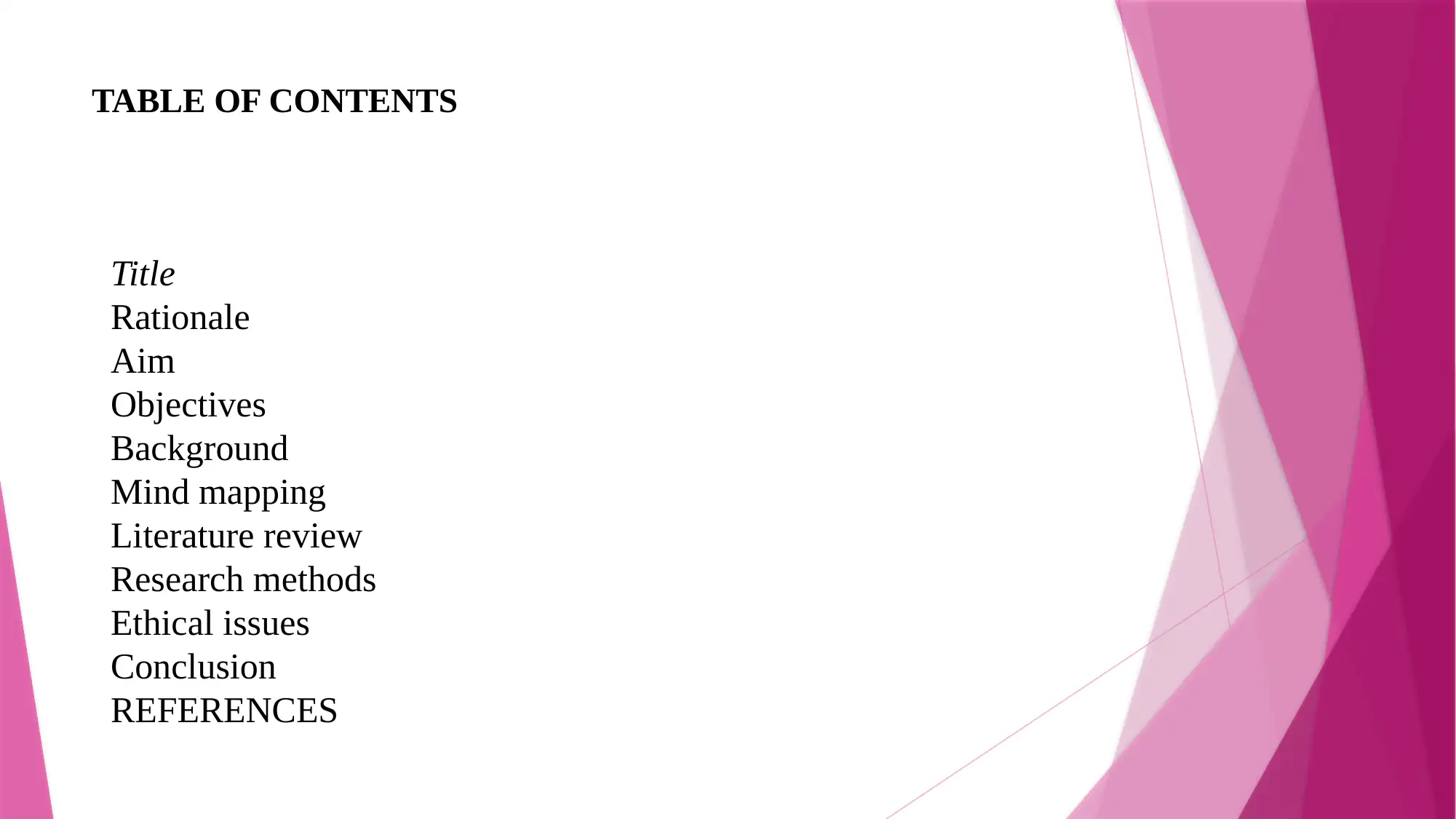
TABLE OF CONTENTS
Title
Rationale
Aim
Objectives
Background
Mind mapping
Literature review
Research methods
Ethical issues
Conclusion
REFERENCES
Title
Rationale
Aim
Objectives
Background
Mind mapping
Literature review
Research methods
Ethical issues
Conclusion
REFERENCES

Title
Investigating the need and ways of cross cultural training
within the health care services. A study on Philips in United
Arab Emirates.
Investigating the need and ways of cross cultural training
within the health care services. A study on Philips in United
Arab Emirates.
⊘ This is a preview!⊘
Do you want full access?
Subscribe today to unlock all pages.

Trusted by 1+ million students worldwide
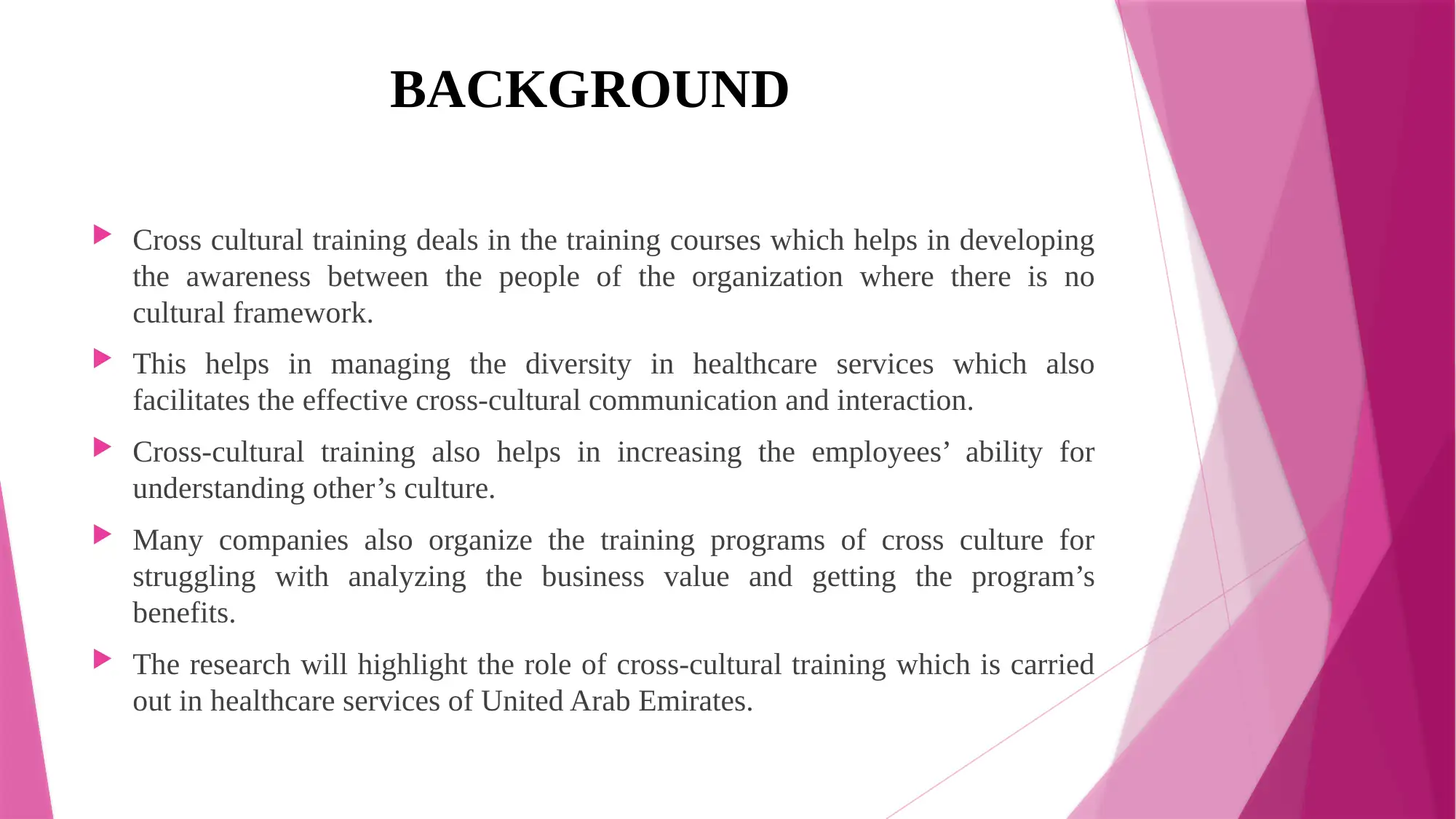
BACKGROUND
Cross cultural training deals in the training courses which helps in developing
the awareness between the people of the organization where there is no
cultural framework.
This helps in managing the diversity in healthcare services which also
facilitates the effective cross-cultural communication and interaction.
Cross-cultural training also helps in increasing the employees’ ability for
understanding other’s culture.
Many companies also organize the training programs of cross culture for
struggling with analyzing the business value and getting the program’s
benefits.
The research will highlight the role of cross-cultural training which is carried
out in healthcare services of United Arab Emirates.
Cross cultural training deals in the training courses which helps in developing
the awareness between the people of the organization where there is no
cultural framework.
This helps in managing the diversity in healthcare services which also
facilitates the effective cross-cultural communication and interaction.
Cross-cultural training also helps in increasing the employees’ ability for
understanding other’s culture.
Many companies also organize the training programs of cross culture for
struggling with analyzing the business value and getting the program’s
benefits.
The research will highlight the role of cross-cultural training which is carried
out in healthcare services of United Arab Emirates.
Paraphrase This Document
Need a fresh take? Get an instant paraphrase of this document with our AI Paraphraser
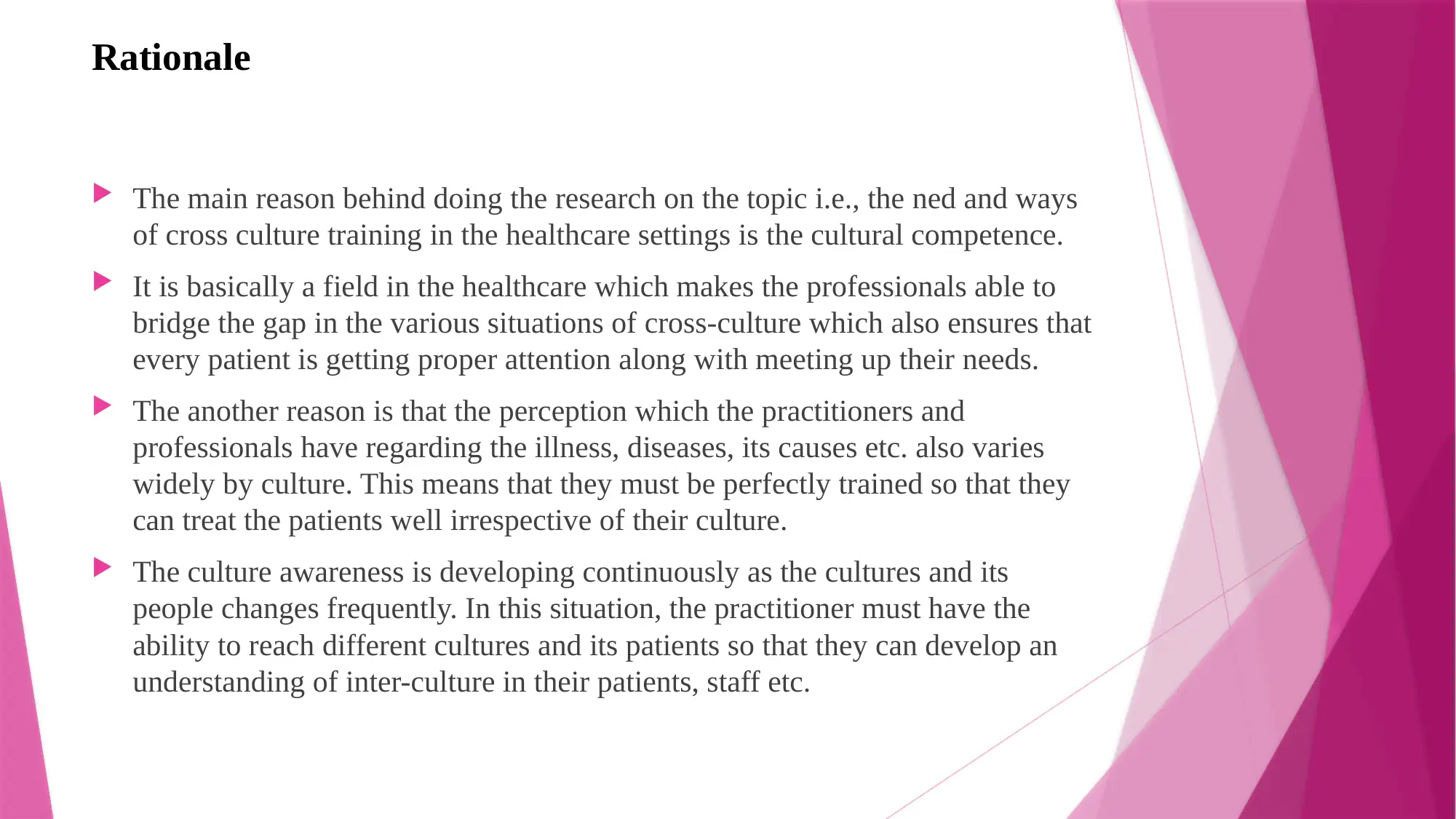
Rationale
The main reason behind doing the research on the topic i.e., the ned and ways
of cross culture training in the healthcare settings is the cultural competence.
It is basically a field in the healthcare which makes the professionals able to
bridge the gap in the various situations of cross-culture which also ensures that
every patient is getting proper attention along with meeting up their needs.
The another reason is that the perception which the practitioners and
professionals have regarding the illness, diseases, its causes etc. also varies
widely by culture. This means that they must be perfectly trained so that they
can treat the patients well irrespective of their culture.
The culture awareness is developing continuously as the cultures and its
people changes frequently. In this situation, the practitioner must have the
ability to reach different cultures and its patients so that they can develop an
understanding of inter-culture in their patients, staff etc.
The main reason behind doing the research on the topic i.e., the ned and ways
of cross culture training in the healthcare settings is the cultural competence.
It is basically a field in the healthcare which makes the professionals able to
bridge the gap in the various situations of cross-culture which also ensures that
every patient is getting proper attention along with meeting up their needs.
The another reason is that the perception which the practitioners and
professionals have regarding the illness, diseases, its causes etc. also varies
widely by culture. This means that they must be perfectly trained so that they
can treat the patients well irrespective of their culture.
The culture awareness is developing continuously as the cultures and its
people changes frequently. In this situation, the practitioner must have the
ability to reach different cultures and its patients so that they can develop an
understanding of inter-culture in their patients, staff etc.
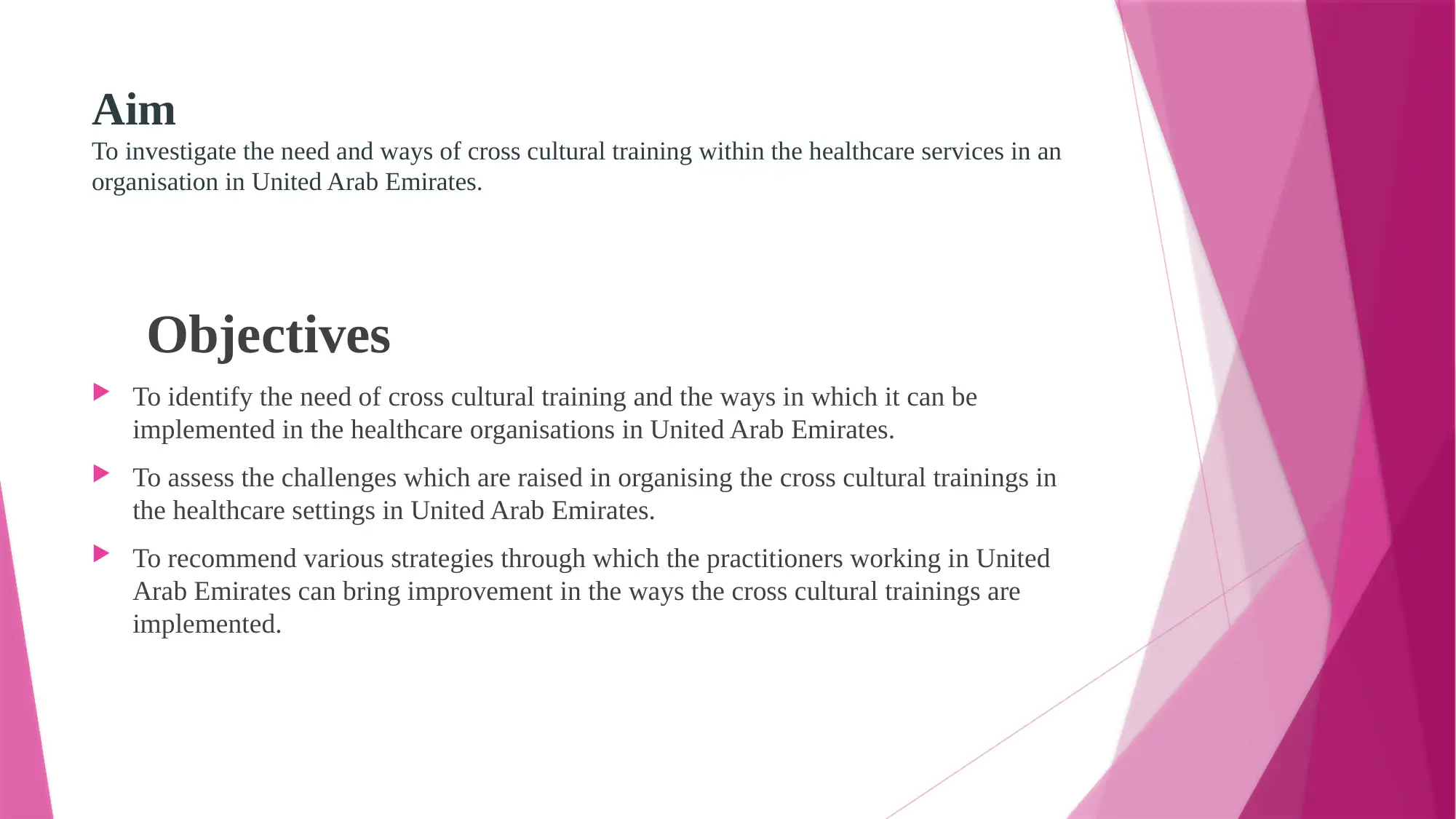
Aim
To investigate the need and ways of cross cultural training within the healthcare services in an
organisation in United Arab Emirates.
Objectives
To identify the need of cross cultural training and the ways in which it can be
implemented in the healthcare organisations in United Arab Emirates.
To assess the challenges which are raised in organising the cross cultural trainings in
the healthcare settings in United Arab Emirates.
To recommend various strategies through which the practitioners working in United
Arab Emirates can bring improvement in the ways the cross cultural trainings are
implemented.
To investigate the need and ways of cross cultural training within the healthcare services in an
organisation in United Arab Emirates.
Objectives
To identify the need of cross cultural training and the ways in which it can be
implemented in the healthcare organisations in United Arab Emirates.
To assess the challenges which are raised in organising the cross cultural trainings in
the healthcare settings in United Arab Emirates.
To recommend various strategies through which the practitioners working in United
Arab Emirates can bring improvement in the ways the cross cultural trainings are
implemented.
⊘ This is a preview!⊘
Do you want full access?
Subscribe today to unlock all pages.

Trusted by 1+ million students worldwide
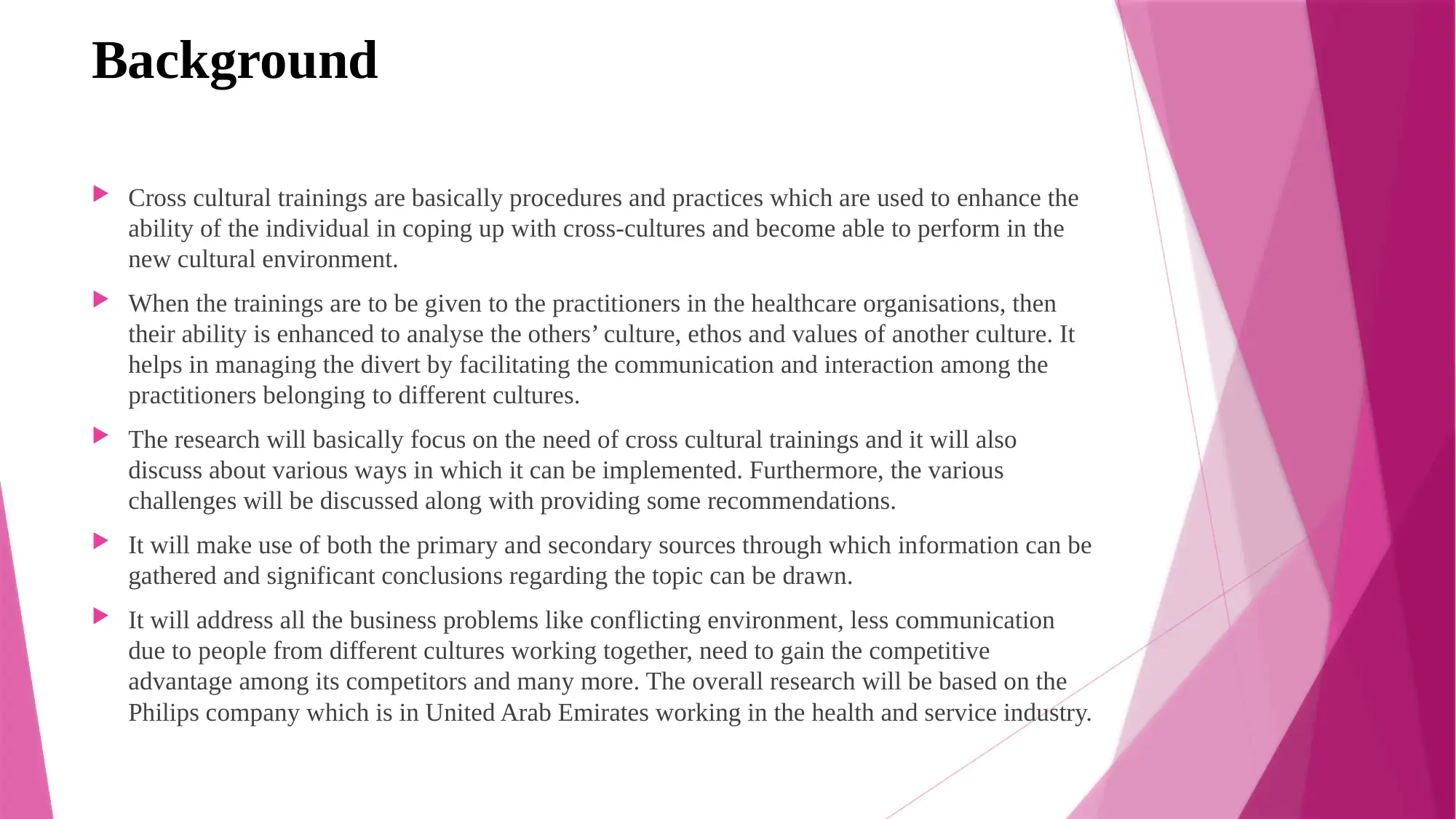
Background
Cross cultural trainings are basically procedures and practices which are used to enhance the
ability of the individual in coping up with cross-cultures and become able to perform in the
new cultural environment.
When the trainings are to be given to the practitioners in the healthcare organisations, then
their ability is enhanced to analyse the others’ culture, ethos and values of another culture. It
helps in managing the divert by facilitating the communication and interaction among the
practitioners belonging to different cultures.
The research will basically focus on the need of cross cultural trainings and it will also
discuss about various ways in which it can be implemented. Furthermore, the various
challenges will be discussed along with providing some recommendations.
It will make use of both the primary and secondary sources through which information can be
gathered and significant conclusions regarding the topic can be drawn.
It will address all the business problems like conflicting environment, less communication
due to people from different cultures working together, need to gain the competitive
advantage among its competitors and many more. The overall research will be based on the
Philips company which is in United Arab Emirates working in the health and service industry.
Cross cultural trainings are basically procedures and practices which are used to enhance the
ability of the individual in coping up with cross-cultures and become able to perform in the
new cultural environment.
When the trainings are to be given to the practitioners in the healthcare organisations, then
their ability is enhanced to analyse the others’ culture, ethos and values of another culture. It
helps in managing the divert by facilitating the communication and interaction among the
practitioners belonging to different cultures.
The research will basically focus on the need of cross cultural trainings and it will also
discuss about various ways in which it can be implemented. Furthermore, the various
challenges will be discussed along with providing some recommendations.
It will make use of both the primary and secondary sources through which information can be
gathered and significant conclusions regarding the topic can be drawn.
It will address all the business problems like conflicting environment, less communication
due to people from different cultures working together, need to gain the competitive
advantage among its competitors and many more. The overall research will be based on the
Philips company which is in United Arab Emirates working in the health and service industry.
Paraphrase This Document
Need a fresh take? Get an instant paraphrase of this document with our AI Paraphraser
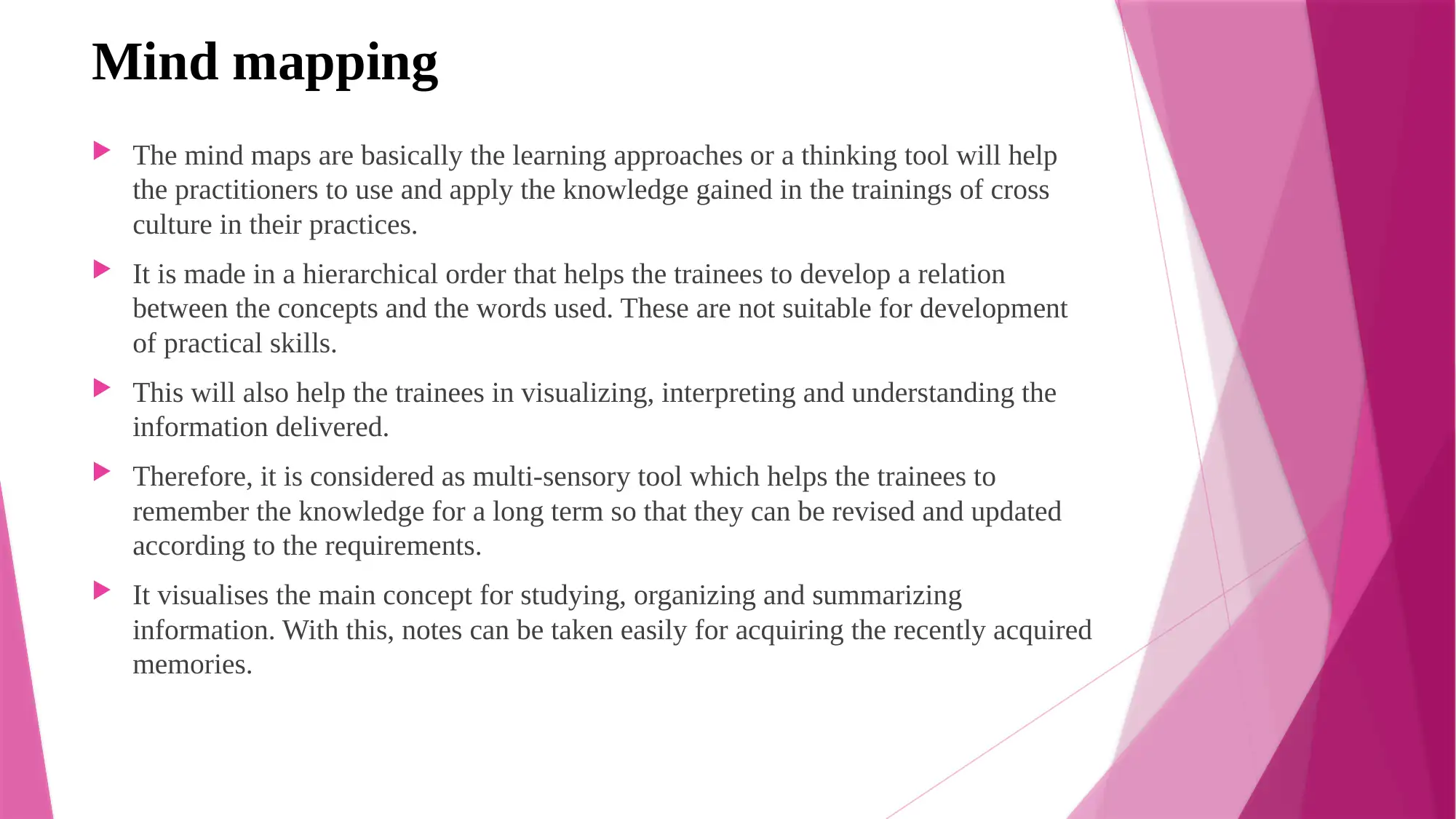
Mind mapping
The mind maps are basically the learning approaches or a thinking tool will help
the practitioners to use and apply the knowledge gained in the trainings of cross
culture in their practices.
It is made in a hierarchical order that helps the trainees to develop a relation
between the concepts and the words used. These are not suitable for development
of practical skills.
This will also help the trainees in visualizing, interpreting and understanding the
information delivered.
Therefore, it is considered as multi-sensory tool which helps the trainees to
remember the knowledge for a long term so that they can be revised and updated
according to the requirements.
It visualises the main concept for studying, organizing and summarizing
information. With this, notes can be taken easily for acquiring the recently acquired
memories.
The mind maps are basically the learning approaches or a thinking tool will help
the practitioners to use and apply the knowledge gained in the trainings of cross
culture in their practices.
It is made in a hierarchical order that helps the trainees to develop a relation
between the concepts and the words used. These are not suitable for development
of practical skills.
This will also help the trainees in visualizing, interpreting and understanding the
information delivered.
Therefore, it is considered as multi-sensory tool which helps the trainees to
remember the knowledge for a long term so that they can be revised and updated
according to the requirements.
It visualises the main concept for studying, organizing and summarizing
information. With this, notes can be taken easily for acquiring the recently acquired
memories.
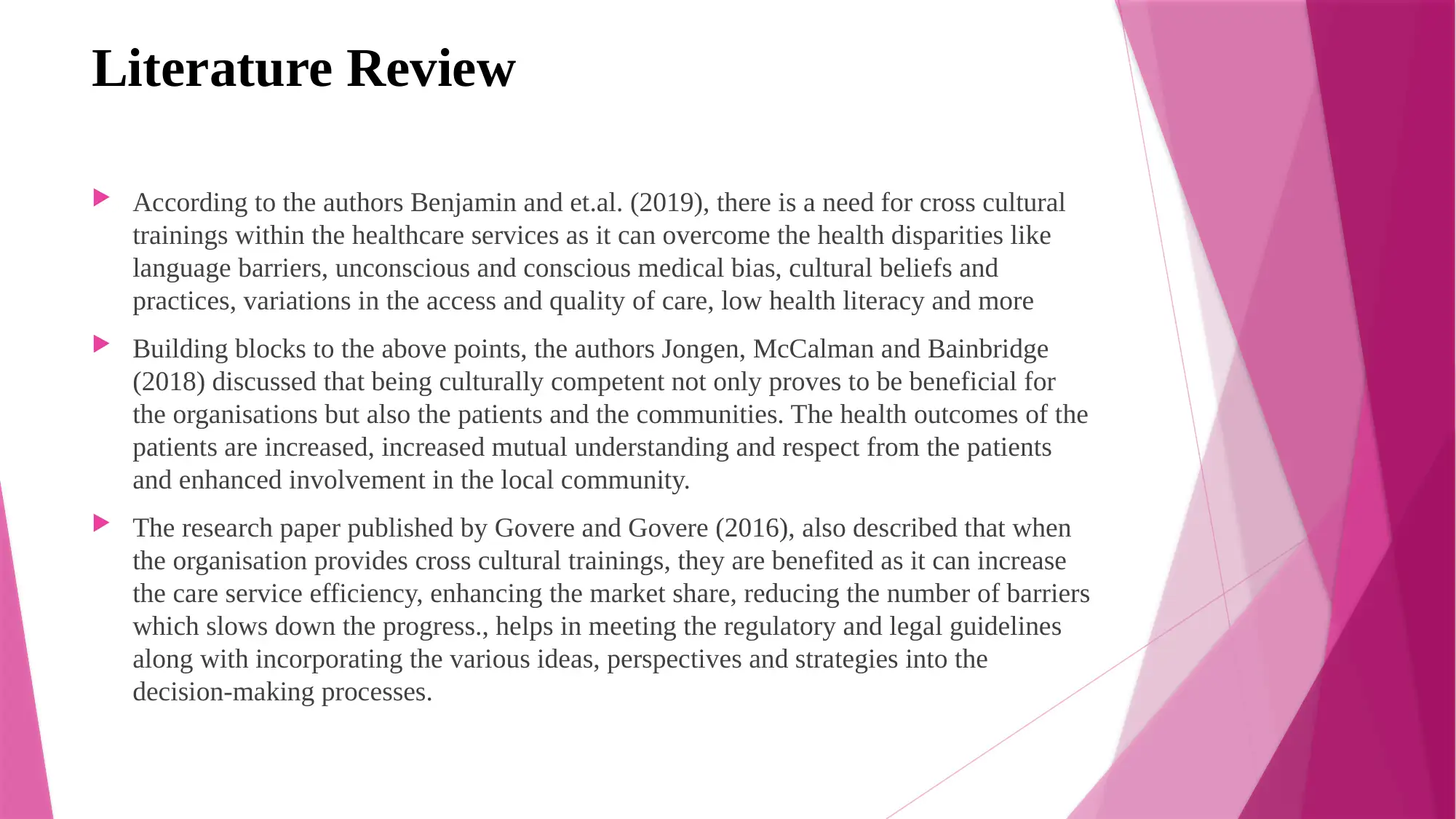
Literature Review
According to the authors Benjamin and et.al. (2019), there is a need for cross cultural
trainings within the healthcare services as it can overcome the health disparities like
language barriers, unconscious and conscious medical bias, cultural beliefs and
practices, variations in the access and quality of care, low health literacy and more
Building blocks to the above points, the authors Jongen, McCalman and Bainbridge
(2018) discussed that being culturally competent not only proves to be beneficial for
the organisations but also the patients and the communities. The health outcomes of the
patients are increased, increased mutual understanding and respect from the patients
and enhanced involvement in the local community.
The research paper published by Govere and Govere (2016), also described that when
the organisation provides cross cultural trainings, they are benefited as it can increase
the care service efficiency, enhancing the market share, reducing the number of barriers
which slows down the progress., helps in meeting the regulatory and legal guidelines
along with incorporating the various ideas, perspectives and strategies into the
decision-making processes.
According to the authors Benjamin and et.al. (2019), there is a need for cross cultural
trainings within the healthcare services as it can overcome the health disparities like
language barriers, unconscious and conscious medical bias, cultural beliefs and
practices, variations in the access and quality of care, low health literacy and more
Building blocks to the above points, the authors Jongen, McCalman and Bainbridge
(2018) discussed that being culturally competent not only proves to be beneficial for
the organisations but also the patients and the communities. The health outcomes of the
patients are increased, increased mutual understanding and respect from the patients
and enhanced involvement in the local community.
The research paper published by Govere and Govere (2016), also described that when
the organisation provides cross cultural trainings, they are benefited as it can increase
the care service efficiency, enhancing the market share, reducing the number of barriers
which slows down the progress., helps in meeting the regulatory and legal guidelines
along with incorporating the various ideas, perspectives and strategies into the
decision-making processes.
⊘ This is a preview!⊘
Do you want full access?
Subscribe today to unlock all pages.

Trusted by 1+ million students worldwide
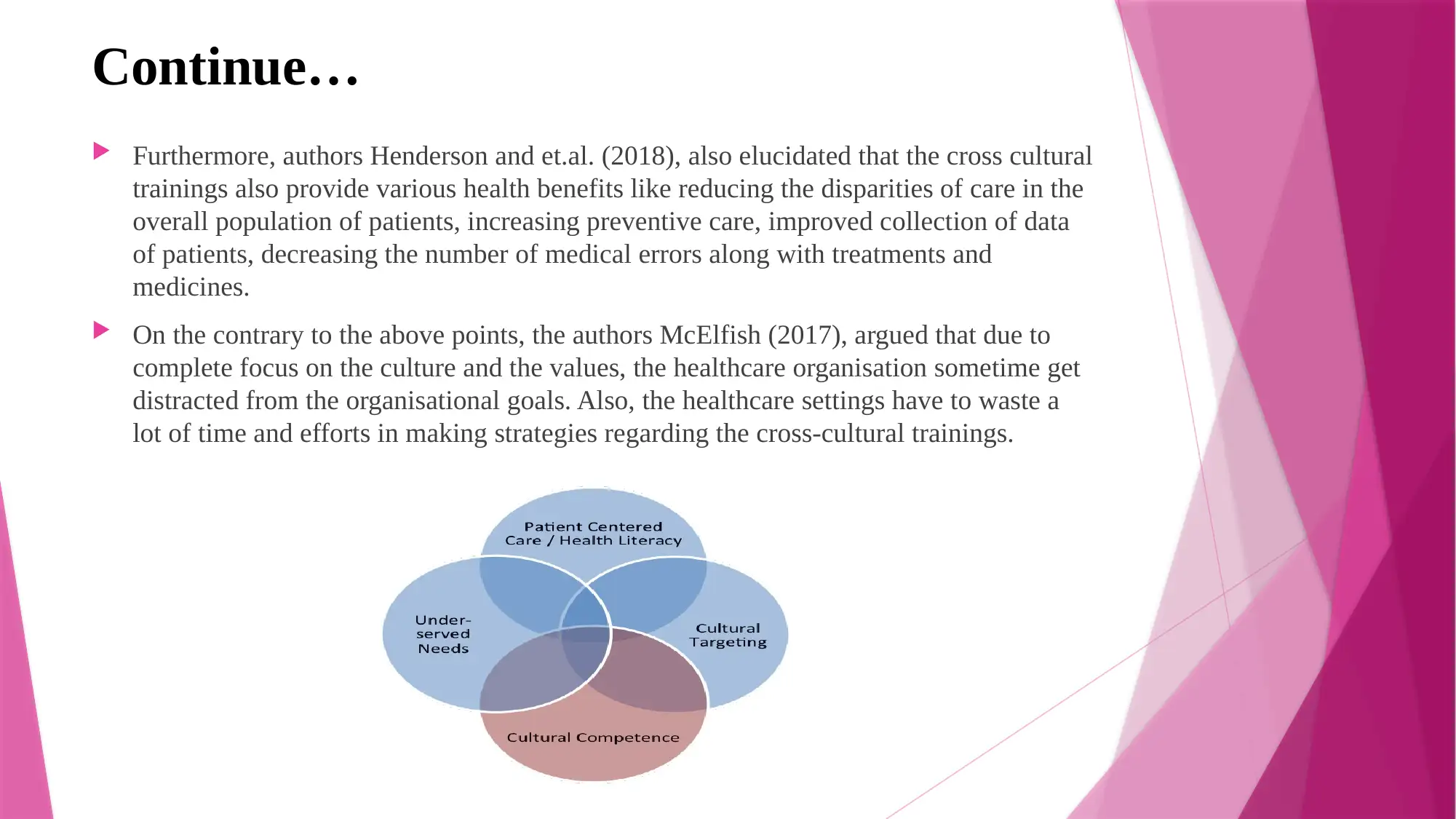
Continue…
Furthermore, authors Henderson and et.al. (2018), also elucidated that the cross cultural
trainings also provide various health benefits like reducing the disparities of care in the
overall population of patients, increasing preventive care, improved collection of data
of patients, decreasing the number of medical errors along with treatments and
medicines.
On the contrary to the above points, the authors McElfish (2017), argued that due to
complete focus on the culture and the values, the healthcare organisation sometime get
distracted from the organisational goals. Also, the healthcare settings have to waste a
lot of time and efforts in making strategies regarding the cross-cultural trainings.
Furthermore, authors Henderson and et.al. (2018), also elucidated that the cross cultural
trainings also provide various health benefits like reducing the disparities of care in the
overall population of patients, increasing preventive care, improved collection of data
of patients, decreasing the number of medical errors along with treatments and
medicines.
On the contrary to the above points, the authors McElfish (2017), argued that due to
complete focus on the culture and the values, the healthcare organisation sometime get
distracted from the organisational goals. Also, the healthcare settings have to waste a
lot of time and efforts in making strategies regarding the cross-cultural trainings.
Paraphrase This Document
Need a fresh take? Get an instant paraphrase of this document with our AI Paraphraser
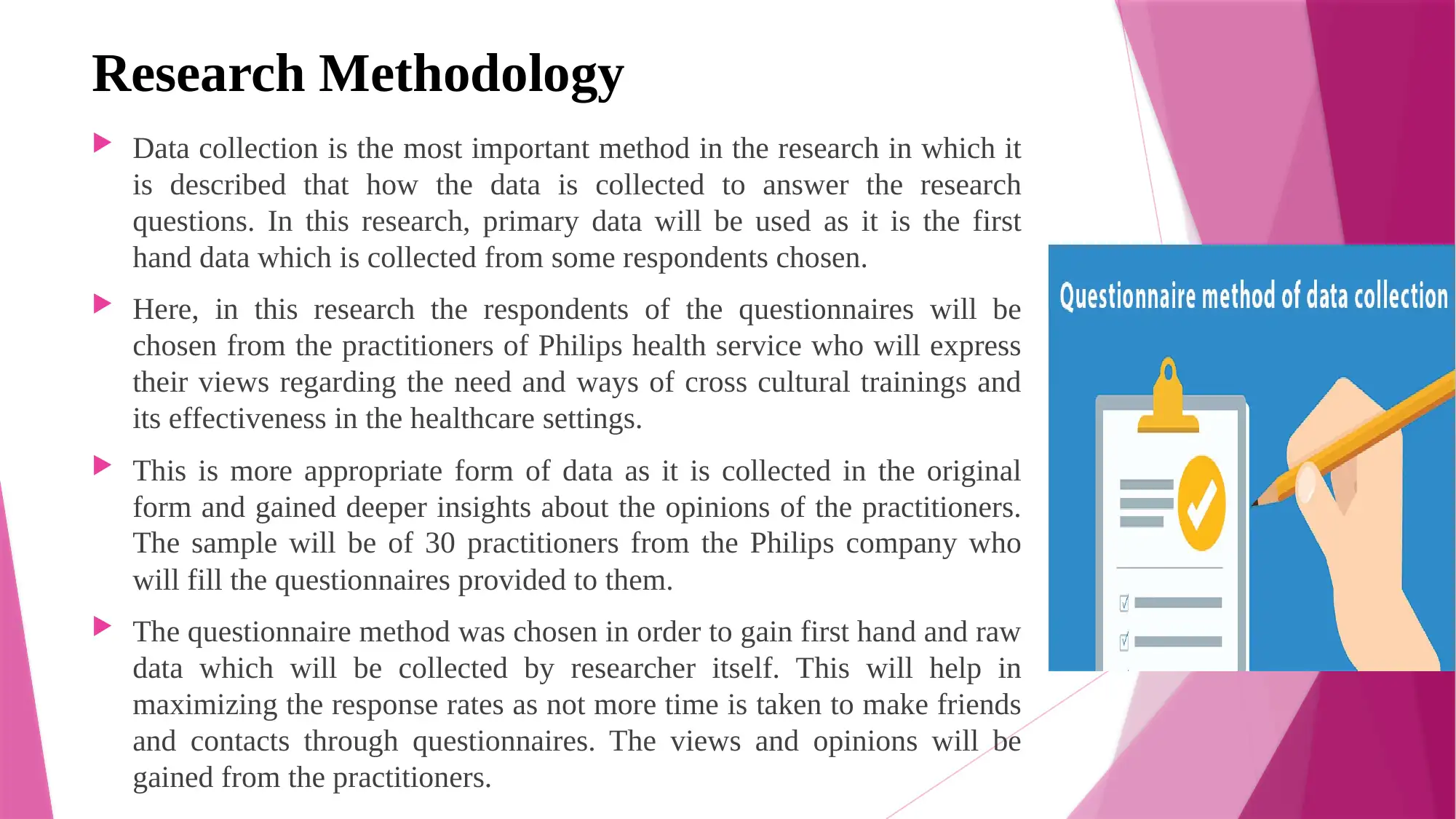
Research Methodology
Data collection is the most important method in the research in which it
is described that how the data is collected to answer the research
questions. In this research, primary data will be used as it is the first
hand data which is collected from some respondents chosen.
Here, in this research the respondents of the questionnaires will be
chosen from the practitioners of Philips health service who will express
their views regarding the need and ways of cross cultural trainings and
its effectiveness in the healthcare settings.
This is more appropriate form of data as it is collected in the original
form and gained deeper insights about the opinions of the practitioners.
The sample will be of 30 practitioners from the Philips company who
will fill the questionnaires provided to them.
The questionnaire method was chosen in order to gain first hand and raw
data which will be collected by researcher itself. This will help in
maximizing the response rates as not more time is taken to make friends
and contacts through questionnaires. The views and opinions will be
gained from the practitioners.
Data collection is the most important method in the research in which it
is described that how the data is collected to answer the research
questions. In this research, primary data will be used as it is the first
hand data which is collected from some respondents chosen.
Here, in this research the respondents of the questionnaires will be
chosen from the practitioners of Philips health service who will express
their views regarding the need and ways of cross cultural trainings and
its effectiveness in the healthcare settings.
This is more appropriate form of data as it is collected in the original
form and gained deeper insights about the opinions of the practitioners.
The sample will be of 30 practitioners from the Philips company who
will fill the questionnaires provided to them.
The questionnaire method was chosen in order to gain first hand and raw
data which will be collected by researcher itself. This will help in
maximizing the response rates as not more time is taken to make friends
and contacts through questionnaires. The views and opinions will be
gained from the practitioners.
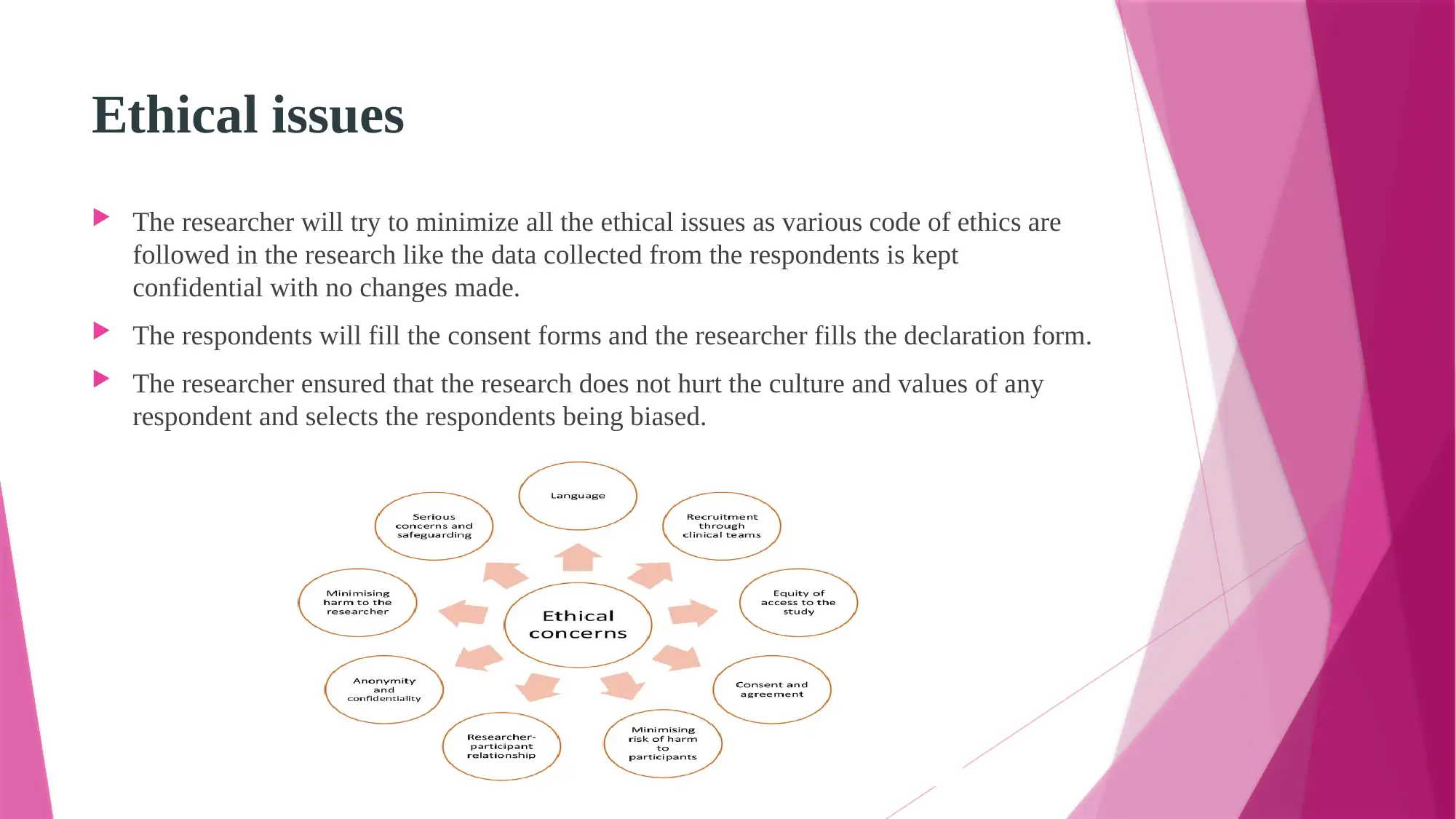
Ethical issues
The researcher will try to minimize all the ethical issues as various code of ethics are
followed in the research like the data collected from the respondents is kept
confidential with no changes made.
The respondents will fill the consent forms and the researcher fills the declaration form.
The researcher ensured that the research does not hurt the culture and values of any
respondent and selects the respondents being biased.
The researcher will try to minimize all the ethical issues as various code of ethics are
followed in the research like the data collected from the respondents is kept
confidential with no changes made.
The respondents will fill the consent forms and the researcher fills the declaration form.
The researcher ensured that the research does not hurt the culture and values of any
respondent and selects the respondents being biased.
⊘ This is a preview!⊘
Do you want full access?
Subscribe today to unlock all pages.

Trusted by 1+ million students worldwide
1 out of 15
Related Documents
Your All-in-One AI-Powered Toolkit for Academic Success.
+13062052269
info@desklib.com
Available 24*7 on WhatsApp / Email
![[object Object]](/_next/static/media/star-bottom.7253800d.svg)
Unlock your academic potential
Copyright © 2020–2026 A2Z Services. All Rights Reserved. Developed and managed by ZUCOL.





